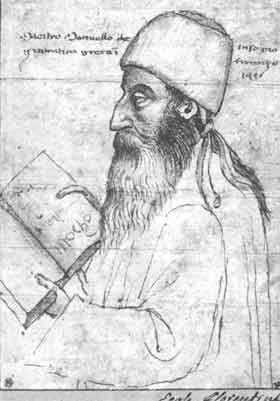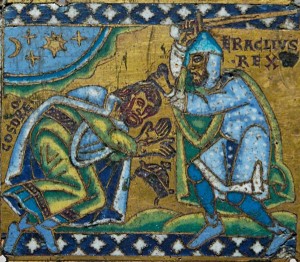
Chrysoloras
Listener Gerardo asked if the Renaissance can really be attributed to Byzantium’s influence. I think it’s going too far to say that Byzantine émigrés caused the Renaissance, but they certainly shaped it. Western Europe was rediscovering its classical past and was fascinated especially by ancient Greece when Byzantine figures like Pletho, Chrysoloras and Cydones arrived. They acted as a catalyst to a movement already underway, tutoring some of the earliest figures of the Renaissance. The study of Greek- which had died out in medieval Europe- was re-introduced and the West was re-acquainted with the giants of Greek learning. The Renaissance would undoubtedly have occurred without these direct Byzantine influences, but it would have been much poorer for the absence.
 Reader Kevin asked this question and it’s one that I get a lot. The Islamic contribution to scientific learning is an important one and is widely taught in schools. They played a vital role both in the advancement of science and in its transmission to the West, specifically through Spain. What is frequently overlooked, however, is the Byzantine underpinnings of that achievement. Unlike the West where the pagan aspects of the classical past made it taboo, the East viewed it as inseparable from Christian society. The fourth century Church father Basil of Caesarea summed up the Byzantine position neatly in a pamphlet he wrote called ‘To Young Men, On How They Might Derive Profit from Pagan Literature’. The classical world, in other words, was a treasure trove to be mined- though with extreme caution. This is not to say that the Byzantines continued the Greek spirit of inquiry full bore, merely that they preserved the Greek legacy more or less intact. After the initial shock of Islamic conquest, when it became apparent that the empire wasn’t going to be swept away, relations with the rising Caliphate became more stable, allowing a cultural exchange. The Arabic world absorbed Greek learning and improved on it, pushing the frontiers of medicine and science during the brilliant High Caliphate. Those advances in learning fully belong to Arab genius, but they couldn’t have been accomplished without the preserved texts or tutors and scholars to translate them. These were all ultimately provided by Byzantium.
Reader Kevin asked this question and it’s one that I get a lot. The Islamic contribution to scientific learning is an important one and is widely taught in schools. They played a vital role both in the advancement of science and in its transmission to the West, specifically through Spain. What is frequently overlooked, however, is the Byzantine underpinnings of that achievement. Unlike the West where the pagan aspects of the classical past made it taboo, the East viewed it as inseparable from Christian society. The fourth century Church father Basil of Caesarea summed up the Byzantine position neatly in a pamphlet he wrote called ‘To Young Men, On How They Might Derive Profit from Pagan Literature’. The classical world, in other words, was a treasure trove to be mined- though with extreme caution. This is not to say that the Byzantines continued the Greek spirit of inquiry full bore, merely that they preserved the Greek legacy more or less intact. After the initial shock of Islamic conquest, when it became apparent that the empire wasn’t going to be swept away, relations with the rising Caliphate became more stable, allowing a cultural exchange. The Arabic world absorbed Greek learning and improved on it, pushing the frontiers of medicine and science during the brilliant High Caliphate. Those advances in learning fully belong to Arab genius, but they couldn’t have been accomplished without the preserved texts or tutors and scholars to translate them. These were all ultimately provided by Byzantium.
The empire played a similar catalyst role in the Renaissance. Byzantine émigrés traveled to the West and re-introduced the study of Greek classics, tutoring luminaries like Petrarch and Boccaccio in the process. Cosimo Medici was even so impressed by a lecture on Plato from a Byzantine scholar named Pletho, that he restarted the Academy in Florence. Obviously both the Renaissance and the Arab Enlightenment pushed the frontiers of knowledge in ways that were independent of Byzantium, but neither would have been possible without Byzantine pens.

